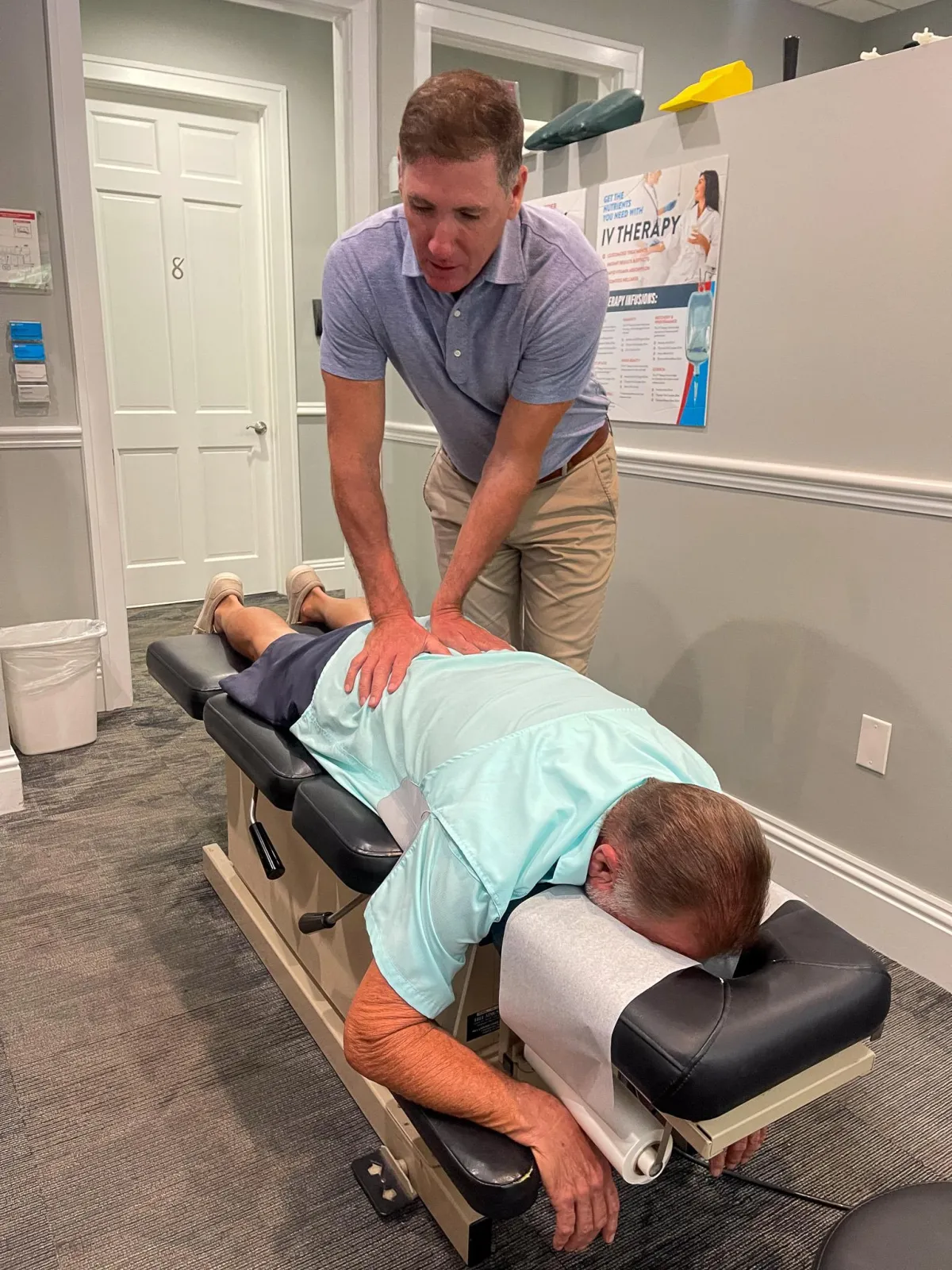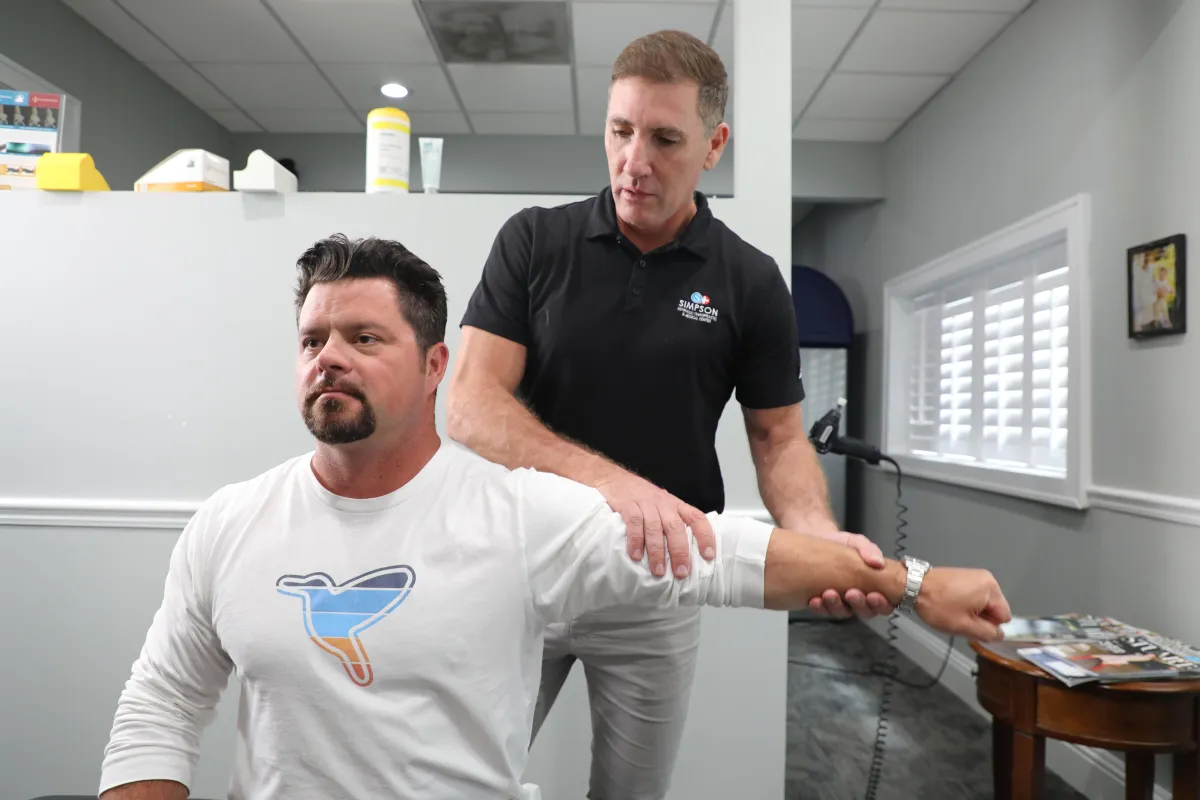Book a consultation or service: 772-571-4200
Chiropractic Adjustments
Move easier, feel better—precisely delivered spinal and joint adjustments tailored to your goals.

Chiropractic Adjustments
What Are Chiropractic Adjustments?
A chiropractic adjustment (also called spinal manipulation or joint manipulation) is a controlled, specific force applied to a joint—most often in the spine—to improve motion, reduce stiffness, and relieve discomfort. Adjustments may be performed by hand or with instruments and can be combined with soft‑tissue work, stretching, and home exercises for lasting results.
Minimally invasive: No surgery or incisions. You may hear a harmless “pop” as gas releases from the joint.
CURRENT OFFER: $99 Recovery Reset
Chiropractic Exam & Adjustment + 60-Minute Custom Massage


Chiropractic Adjustments
How It Works
Consultation & Assessment - Your first visit includes a health history, posture and mobility checks, and targeted orthopedic/neurologic screening. Imaging may be recommended if clinically appropriate. We define your goals (pain relief, mobility, posture, activity/life goals) and outline a plan.
Personalized Care Plan - Based on findings, your chiropractor selects techniques (manual or instrument‑assisted) and frequency (e.g., a short relief phase followed by stabilization/maintenance). You’ll get simple at‑home tips to support progress.
The Adjustment - While positioned comfortably on a padded table, your provider applies a precise, brief force to the targeted joint(s). Some techniques use a drop‑table or handheld instrument for a gentler feel.
Aftercare - Many people notice easier movement right away. Mild soreness—similar to a workout—can occur for 24–48 hours. Hydration, light movement, and the suggested exercises typically help.
What You’ll Feel & When (Typical Timeline)
Immediately to 24 hours: Many notice easier movement and reduced tension.
24–48 hours: Possible mild soreness; light mobility and hydration recommended.
1–2 weeks: With a short series of visits and home exercises, improvements in mobility and posture usually build. Ongoing maintenance is optional based on goals and job/sport demands.
Benefits of Chiropractic Adjustments
Pain relief & mobility - Helps reduce back and neck pain, headaches related to the neck, and stiffness—so you can move more freely.
Posture & alignment support - Targeted adjustments plus simple exercises can help counter desk posture and repetitive‑stress patterns.
Function for daily life & sport - Restores joint mechanics to support lifting, sitting, driving, training, and recovery.
Results vary by person and condition. Adjustments complement—not replace—medical care, sleep, and good movement habits.

WHO IT'S FOR
Chiropractic Adjustments are Ideal For
Back or neck pain, stiffness, or reduced range of motion
Headaches that may be related to neck tension or posture
Post‑injury recovery (e.g., sprain/strain, whiplash) when appropriate
Desk posture / tech‑neck and recurring tightness
Active people & athletes seeking better movement and recovery
Anyone looking to feel better in their day to day life!
Safety & Who Should Avoid or Consult First
Chiropractic adjustments are safe for most people when performed by a licensed provider with appropriate screening. Rare complications are possible—your clinician will review risks and alternatives.
Generally not appropriate / use caution:
Severe osteoporosis or bone fragility
Known spinal cancer or active spinal infection
Unstable fractures or significant neurologic deficits
Certain vascular risks (especially for high‑velocity neck manipulation)
Congenital/structural abnormalities of the upper cervical spine
Always discuss your personal health situation with the provider. We’ll tailor techniques (including gentler options) to your needs.
Why Longevity House
The Simpson Medical Difference
At Simpson Medical, we personalize every chiropractic plan based on your goals. Our team is extensively trained to provide relief.
Personalized, goal‑driven care
No one‑size‑fits‑all. Your plan reflects your body, lifestyle, and targets.
Clinical standards in a calm setting
Licensed chiropractic care with clear explanations at each step.
Education over sales
You’ll know what we’re doing, why, and how to help it stick between visits.
Whole‑body approach
We can integrate soft‑tissue work, targeted stretching, and recovery services for durable results.
GET STARTED
Ready to move better?
Book your chiropractic consult now. Includes screening to ensure adjustments are a good fit for you.
FAQ
Any Concerns?
We'll put your mind at rest
Q: What’s the “crack” sound?
A harmless gas release (cavitation) from the joint fluid as pressure changes—not bones grinding. Some effective adjustments make no sound at all.
Q: Will it hurt?
Most adjustments are comfortable; some people feel a quick, pressure‑like sensation. Temporary soreness—like after new exercise—is possible.
Q: How many visits will I need?
It depends on your goals, exam findings, and how your body responds. Some feel relief quickly; others benefit from a short series plus home exercises before transitioning to maintenance.
Q: Do you adjust without twisting?
Yes. When appropriate, we use drop‑table and instrument‑assisted methods for a gentler experience.

BOOK YOUR CONSULT
Chiropractic Adjustments
Includes screening to ensure adjustments are a good fit for you.
SPECIAL OFFER
Enjoy a free day-pass to the Longevity House

©2026 Simpson Medical. All Rights Reserved. Accessibility Statement
IMPORTANT! All information presented in this website is intended for informational purposes only and not for the purpose of rendering medical advice. Statements made on this website have not been evaluated by the Food and Drug Administration. The information contained herein is not intended to diagnose, treat, cure or prevent any disease.
License #: MM15641, MM23183